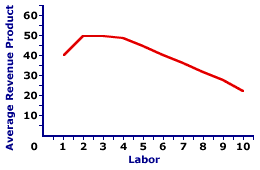
|
|
SAVING LINE: A graphical depiction of the relation between household saving and household disposable income. The slope of this line is positive, greater than zero, less than one, and goes by the name marginal propensity to save. The vertical intercept of the saving line is autonomous saving. The saving and investment, or leakage and injection, analysis used in Keynesian economics begins with the saving line. Because consumption is the difference between disposable income and saving, the consumption line is a complementary relation to the saving line.
Visit the GLOSS*arama
|
|


|

|
                           AVERAGE REVENUE PRODUCT CURVE: A curve that graphically illustrates the relation between average revenue product and the quantity of the variable input, holding all other inputs fixed. This curve indicates the per unit revenue at each level of the variable input. The average revenue product curve is one of two related curves often used in the analysis of factor demand. The other, and more important, is marginal revenue product curve. The average revenue product curve indicates how average revenue product is related to the quantity of a variable input used in production. While the analysis of factor markets tends to focus on labor as the variable input, a average revenue product curve can be constructed for any input.| Average Revenue Product Curve |  |
This diagram graphically represents the relation between average revenue product and the variable input. This particular curve is derived from the hourly production of Super Deluxe TexMex Gargantuan Tacos (with sour cream and jalapeno peppers) as Waldo's TexMex Taco World restaurant employs additional workers. The number of workers, measured on the horizontal axis, ranges from 0 to 10 and the average revenue product, measured on the vertical axis, ranges from $0 to $60.The shape of this average revenue product curve is most important. For the first two workers of variable input, average revenue product increases. This is reflected in a positive slope of the average revenue product curve. After the third worker, average revenue product declines. This is seen as a negative slope. While average revenue product continues to decline, it never reaches zero nor becomes negative. To do so requires total revenue to become zero and negative, which just does not happen. The hump-shape of the average revenue product curve is indirectly caused by increasing and decreasing marginal returns. The upward-sloping portion of the average revenue product curve, up to the second worker, is indirectly due to increasing marginal returns. The downward-sloping portion of the average revenue product curve, after the third worker, is indirectly due to decreasing marginal returns. and the law of diminishing marginal returns.

Recommended Citation:AVERAGE REVENUE PRODUCT CURVE, AmosWEB Encyclonomic WEB*pedia, http://www.AmosWEB.com, AmosWEB LLC, 2000-2025. [Accessed: July 18, 2025].
Check Out These Related Terms... | | | | | | | | |
Or For A Little Background... | | | | | | | | | | | | | |
And For Further Study... | | | | | | | | | |
Search Again?
Back to the WEB*pedia
|



|

|
ORANGE REBELOON
[What's This?]
Today, you are likely to spend a great deal of time wandering around the downtown area trying to buy either shoe laces for your snow boots or a rim for your spare tire. Be on the lookout for the happiest person in the room.
Your Complete Scope
This isn't me! What am I?
|

|
|
A U.S. dime has 118 groves around its edge, one fewer than a U.S. quarter.
|

|
|
"A winner is someone who recognizes his God-given talents, works his tail off to develop them into skills, and uses those skills to accomplish his goals. " -- Larry Bird, basketball player
|

|
BIS
Bank for International Settlements
|

|
|
Tell us what you think about AmosWEB. Like what you see? Have suggestions for improvements? Let us know. Click the User Feedback link.
User Feedback
|


|


